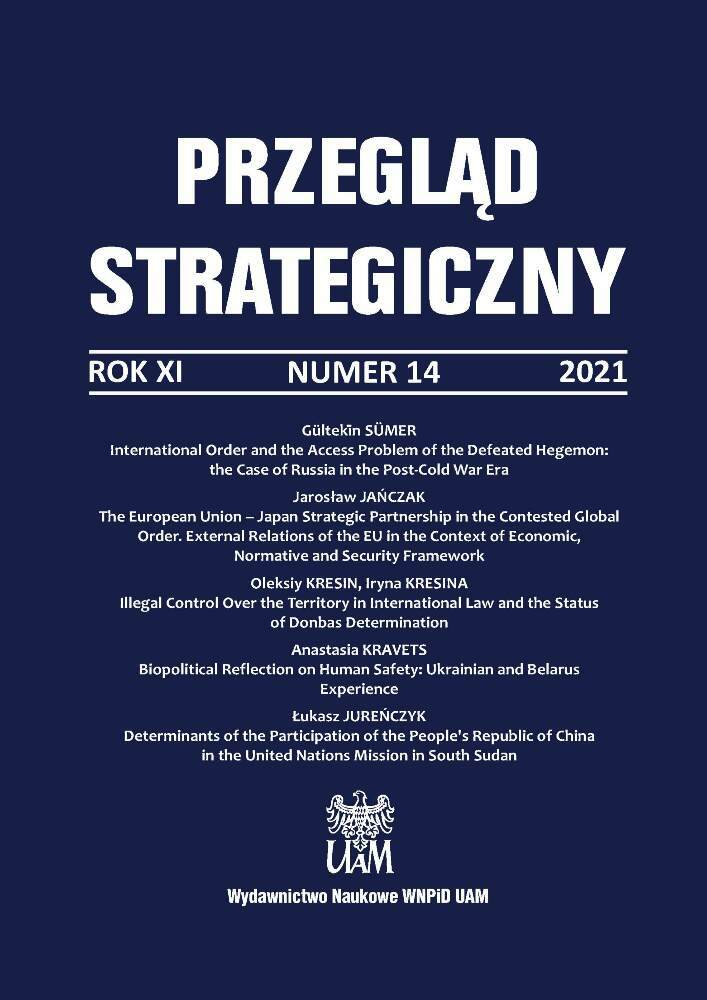Abstract
Today, strategic culture becomes an essential element of the national security policy of the Russian Federation. While absorbing some modern aspects, its strategic culture reflects historical lessons learnt by the Russian Empire and the USSR. Russia still cannot refuse from the idea to restore its superpower status and to fight for new territories. Thus, we can define a number of essential elements of the Russian strategic culture formed in relation to the historical and contemporary development of this state. Throughout the history, the Russians have legitimized the decisions and activities of the ruling elites. As the Russian leadership has long built up powerful associations which had taken root in the minds of people while remembering patriotism and love for their Motherland, the Russians believe in the importance of maintaining and enhancing patriotic feelings. While cultivating its civilizational and cultural detachment, Russia continues developing its own messianic idea which envisages the views of the special historical kismet of Russia. In order to fulfill its global tasks, Russia uses the policy of military interventions and violates state sovereignty of other countries, since the ‘militant’ political culture of its leaders has always militarized the strategic culture of the RF.
So, the strategic culture of Russia emanates from the unique position and history of this state which manages to adapt it to the new realities. However, Russia’s aspirations to reclaim its status as a global superpower at any cost do not allow its strategic culture to be changed or even to be altered.
References
Alekseeva T. A. (2012), Strategicheskaia kultura: evoliutsiia kontseptsii, “Teoreticheskaia politologiia”, No. 5 (in Russian).
Al-Rodhan N. (2015), Strategic Culture and Pragmatic National Interest, “Global Policy Journal”, July 22, https://www.globalpolicyjournal.com/blog/22/07/2015/strategic-culture-and-pragmatic-national-interest (29.03.2020).
Al-Rodhan N. (2018), Russia: Space Power and Strategic Culture – Analysis, “eurasia.review: news & analysis”, February 23, https://www.eurasiareview.com/23022018-russia-space-power-and-strategic-culture-analysis/ (29.03.2020).
Campbell D. (1998), Writing Security: United States Foreign Policy and the Politics of Identity, Minneapolis.
Chappell L. (2009), Differing Member State Approaches to the Development of the EU Battlegroup Concept: Implications for CSDP, “European Security”, Vol. 18, No. 4.
Covington S. R. (2019), Chotyry stovpy rosiiskoi stratehichnoi kultury, “MIZHNARODNYI TSENTR PROTYDII ROSIISKII PROPAHANDI”, December 5, https://www.iccrp.org/chotyry-stovpy-rosijskoyi-strategichnoyi-kultury/ (29.03.2020) (in Ukrainian).
De Vreede E. (2012), Culture, Civilization and Identity, “Polis: Political Studies”, No. 5.
Dziuba I. (2001), Ukraina – Rosiia: kontseptualni osnovy humanitarnykh vidnosyn, Kyiv (in Ukrainian).
Foucault M. (1984), Right of Death and Power over Life, in: The Foucault Reader, (ed.) P. Rabinow, London.
Gosudarstvennaia Duma Federalnogo Sobraniia RF (2020), Vladimir Putin podpisal zakon ob izmeneniiah v Konstitutsiiu, March 14, http://duma.gov.ru/news/48024/ (29.03.2020) (in Russian).
Gray C. (1981), National Styles in Strategy: The American Example, “International Security”, Vol. 6, No. 2.
Gray C. (1988), The Geopolitics of Superpower, Lexington.
Greathouse C. B. (2010), Examining the Role and Methodology of Strategic Culture, “Risk, Hazards & Crisis in Public Policy”, Vol. 1, Iss. 1.
Howard R. D. (2013), Strategic Culture: JSOU Report 13-8, Florida.
Ivanov O. (2007), Amerikanskaia strategicheskaia kultura, “Obozrevatel”, No. 1 (in Russian).
Johnston A. I. (1995), Thinking About Strategic Culture, “International Security”, Vol. 19, No. 4.
Klein Y. (1991), A Theory of Strategic Culture, “Comparative Strategy”, Vol. 10, No. 1.
Longhurst K. (2004), Germany and the Use of Force: The Evolution of German Security Policy 1990–2003, Manchester.
Metz S. (2016), A Tale of Two Strategies: Limited War in U.S. and Russian Strategic Culture, “WORLD POLITICS REVIEW”, April 5, https://www.worldpoliticsreview.com/articles/18393/a-tale-of-two-strategies-limited-war-in-u-s-and-russian-strategic-culture (29.03.2020).
Miklóssy K., Smith H. (2019), Introduction: Reviewing Strategic Culture in the Russian Neighborhood, in: Strategic Culture in Russia’s Neighborhood: Change and Continuity in an In-Between Space, (eds.) K. Miklóssy, H. Smith, London.
O Strategii natsionalnoi bezopasnosti Rossiiskoi Federatsii do 2020 goda (2009), Ukaz Prezidenta Rossiiskoi Federatsii ot 13 maia 2009 goda No. 537, “Prezident Rossii: ofitsialnyi sait”, http://kremlin.ru/supplement/424 (27.04.2021) (in Russian).
O Strategii natsionalnoi bezopasnosti Rossiiskoi Federatsii (2015), Ukaz Prezidenta Rossiiskoi Federatsii ot 31 dekabria 2015 goda No. 683, “MChS Rossii: ofitsialnyi sait”, https://www.mchs.gov.ru/dokumenty/2933 (26.04.2021) (in Russian).
Ob utverzhdenii Kontseptsii natsionalnoi bezopasnosti Rossiiskoi Federatsii (1997), Ukaz Prezidenta Rossiiskoi Federatsii ot 17 dekabria 1997 goda No. 1300, “Prezident Rossii: ofitsialnyi sait”, http://www.kremlin.ru/acts/bank/11782 (29.04.2021) (in Russian).
Putin V. V. (2007), Vystuplenie i diskussiia na Miunhenskoi konferentsii po voprosam politiki bezopasnosti, “Prezident Rossii: ofitsialnyi sait”, February 10, http://kremlin.ru/events/president/transcripts/24034 (29.03.2020) (in Russian).
Putin V. V. (2015), My prekloniaemsia pered vsemi, kto nasmert stoial za kazhduiu ulitsu, kazhdyi dom, kazhdyi rubezh Otchizny: Vystuplenie Prezidenta Rossii na parade, posviashchennom 70-letiiu Pobedy v Velikoi Otechestvennoi voine, “Prezident Rossii: ofitsialnyi sait”, May 9, http://special.kremlin.ru/events/president/transcripts/49438 (29.03.2020) (in Russian).
Rikveilis A. (2007), Strategic Culture in Latvia: Seeking, Defining and Developing, “Baltic Security & Defence Review”, No. 9.
Rykhtik M. I. (2003), Strategicheskaia kultura i novaia kontseptsiia natsionalnoi bezopasnosti SSHA, “Vestnik Nizhegorodskogo universiteta im. N. I. Lobachevskogo”, No. 1 (in Russian).
Snyder J. (1977), The Soviet Strategic Culture: Implications for Limited Nuclear Options, Santa Monica.

